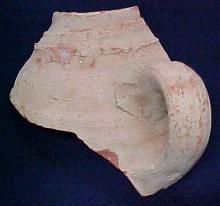|
restoring our biblical and constitutional foundations
|
Cracked Pots
I often refer to the glorious doctrine of man’s
complete and utter inability (AKA, the doctrine of total depravity) on
this website, if for no other reason than this writer is never insensible
to his own utter and complete ineptitude and inadequacy. As Paul puts it
so pithily in 2 Corinthians 4:7, “We have this treasure in earthen pots of
clay, so that the surpassing greatness of the power might be of God, and
not of us.” Now the term “pots of clay” (or “earthen vessels”)
 implies
something brittle, inferior, expendable. Paul could have compared the
Christian to a piece of exquisitely crafted Greek pottery (I have many
such pieces in my office)—an object of great beauty and magnificence—but,
being a realist, he prefers an image that underscores our human weakness
and lowliness—the kind of earthen vessel that nobody bothered to mend
after it had broken.
implies
something brittle, inferior, expendable. Paul could have compared the
Christian to a piece of exquisitely crafted Greek pottery (I have many
such pieces in my office)—an object of great beauty and magnificence—but,
being a realist, he prefers an image that underscores our human weakness
and lowliness—the kind of earthen vessel that nobody bothered to mend
after it had broken.
Elsewhere Paul can write of God choosing “the foolish things of the world to shame the wise [and] the weak things of the world to shame the strong” (1 Corinthians 1:27). His point, it seems to me, is that the treasure has nothing to do with the container, so that others might recognize that the power, the glory, comes from God alone. This is nothing other than divine paradox: the strength of God being manifested in those who are weak; the wisdom of God being expressed through mere “nothings” in the world’s eyes; the powerful Gospel being borne by jars of clay. Paul, in short, is claiming to be a “cracked pot,” if you will, or at least a “crackable pot”—a brittle and delicate vessel that can survive the knocks of life not because of the durability of the pot but because of the sustaining grace of God.
The truth is that if there are any good works in the Christian life, they are non-meritorious. “Not the labors of my hands can fulfill Thy law’s demands.” God rejects every work of man, that is, every work on which man bases his hope for salvation and every work he thinks is necessary to please a holy God. But though our good works are non-meritorious, they are, nevertheless, so important that “God prepared [them] beforehand that we should walk in them” (Ephesians 2:10). We are nothing apart from Christ Jesus, and apart from Him we can do nothing (John 15:5); yet when God redeemed us by grace He also prepared us for good works, because good works are the fruit of a living faith. Thus, summarizing, we may say that all of our good works are really a divine doing, and when we walk in good works we are really working in the sphere of God’s own activity.
Being a “cracked pot” for Jesus means that we are confident that the One who began a work in us will carry it to completion on that day when Jesus Christ returns. This doctrine of divine paradox, when accepted by faith, deprives us of every reason for boasting but also removes every ground for despair. I can think of no better reason for serving God—a God who divinely enables what He himself requires!
Now all boasting is excluded,
Unearned bliss is now my own.
I, in God thus safely rooted,
Boast in sovereign grace alone.
Long before my mother bore me,
E’en before God’s mighty hand
Out of naught made sea and land,
His electing love watched o’er me.
God is love, O angel-voice,
Tongues of men, make him your choice!
July 4, 2003
David Alan Black is the editor of www.daveblackonline.com.